Items
Date is exactly
1983
-
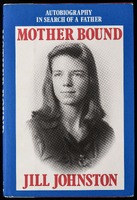 Autobiography in search of a father. Mother bound Jill Johnston (1929-2010) was a critic, journalist, feminist and leader of the lesbian-separatist movement in the 1970s. Before publishing perhaps her best-known work, ‘Lesbian Nation - The Feminist Solution’ in 1973, Johnston wrote on dance for the ‘Village Voice’ newspaper, and was the first of its columnists to come out in print. ‘Mother Bound’ details her complicated family relationships and narrates her life up to 1965. Characterised as “readably rambling, pseudo-psychological ponderings” by one somewhat withering reviewer, though notably less experimental in form than her later criticism, ‘Mother Bound’ was followed by a second volume of autobiography, ‘Paper Daughter’, in 1985.
Autobiography in search of a father. Mother bound Jill Johnston (1929-2010) was a critic, journalist, feminist and leader of the lesbian-separatist movement in the 1970s. Before publishing perhaps her best-known work, ‘Lesbian Nation - The Feminist Solution’ in 1973, Johnston wrote on dance for the ‘Village Voice’ newspaper, and was the first of its columnists to come out in print. ‘Mother Bound’ details her complicated family relationships and narrates her life up to 1965. Characterised as “readably rambling, pseudo-psychological ponderings” by one somewhat withering reviewer, though notably less experimental in form than her later criticism, ‘Mother Bound’ was followed by a second volume of autobiography, ‘Paper Daughter’, in 1985. -
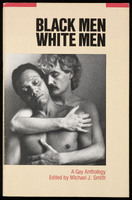 Black men/white men : a gay anthology A collection of forty poems, short fiction and non-fiction pieces which explore the intersections of race and sexuality “from the most scholarly to the most explicit”, by authors such as Langston Hughes, Eric Garber and Bruce Nugent. Contributions on sexual stereotyping, discrimination and anti-Black racism within the white gay community are interspersed with several high-quality monochrome photographs and drawings of gay men, both Black and white, pictured separately and in couples. Editor Michael J. Smith founded the advocacy organisation Black and White Men Together in 1980. Chapters sprung up in cities across the United States – there was even, briefly, a Dalston-Hackney branch in London – and the organisation continues today. Smith died of AIDS in 1989 aged 45.
Black men/white men : a gay anthology A collection of forty poems, short fiction and non-fiction pieces which explore the intersections of race and sexuality “from the most scholarly to the most explicit”, by authors such as Langston Hughes, Eric Garber and Bruce Nugent. Contributions on sexual stereotyping, discrimination and anti-Black racism within the white gay community are interspersed with several high-quality monochrome photographs and drawings of gay men, both Black and white, pictured separately and in couples. Editor Michael J. Smith founded the advocacy organisation Black and White Men Together in 1980. Chapters sprung up in cities across the United States – there was even, briefly, a Dalston-Hackney branch in London – and the organisation continues today. Smith died of AIDS in 1989 aged 45. -
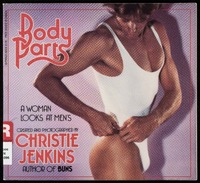 Body parts : a woman looks at men's A Defend Gay’s The Word briefing document about the seized titles lists a book called ‘Body Parts’. Its author and publisher are unclear. The book presented here is a candidate for the correct book, but we cannot be sure. Actress and photographer Christie Jenkins, who was initially inspired by the bodies of male ice-skaters (some of whom are spotlighted in the book) presents here a selection of black-and-white photographs of men. The photographic models are named, and feature in sections focussing on specific body parts, including the subtly described ‘Middle Part’. Some images are published with just a question mark, and readers are invited to guess who is featured. The cover model is Leland (Lee) Nicholl, Jenkins’s ideal of “the perfectly built male”.
Body parts : a woman looks at men's A Defend Gay’s The Word briefing document about the seized titles lists a book called ‘Body Parts’. Its author and publisher are unclear. The book presented here is a candidate for the correct book, but we cannot be sure. Actress and photographer Christie Jenkins, who was initially inspired by the bodies of male ice-skaters (some of whom are spotlighted in the book) presents here a selection of black-and-white photographs of men. The photographic models are named, and feature in sections focussing on specific body parts, including the subtly described ‘Middle Part’. Some images are published with just a question mark, and readers are invited to guess who is featured. The cover model is Leland (Lee) Nicholl, Jenkins’s ideal of “the perfectly built male”. -
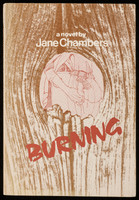 Burning : a novel Jane Chambers (1937-1983) was an award-winning poet, screenwriter and playwright, who broke new ground by bringing happy, well-adjusted lesbian characters to the stage in plays such as ‘Last Summer at Bluefish Cove’. In ‘Burning’, Cynthia and Angela are on holiday in a New England farmhouse when they are possessed by the spirits of two women persecuted for their love some two hundred years earlier. ‘Burning’, Chambers’s first novel, was originally published by Jove in 1978 before being published by JH Press, one of the Gay Presses of New York. In 1981, Chambers received a Human Fund for Dignity Award with Harvey Fierstein (actor and writer of ‘Torch Song Trilogy’, also seized in ‘Operation Tiger’). In the same year, she was diagnosed with a brain tumour and died two years later. Since 1984, the Jane Chambers Playwriting Award has been offered in her name.
Burning : a novel Jane Chambers (1937-1983) was an award-winning poet, screenwriter and playwright, who broke new ground by bringing happy, well-adjusted lesbian characters to the stage in plays such as ‘Last Summer at Bluefish Cove’. In ‘Burning’, Cynthia and Angela are on holiday in a New England farmhouse when they are possessed by the spirits of two women persecuted for their love some two hundred years earlier. ‘Burning’, Chambers’s first novel, was originally published by Jove in 1978 before being published by JH Press, one of the Gay Presses of New York. In 1981, Chambers received a Human Fund for Dignity Award with Harvey Fierstein (actor and writer of ‘Torch Song Trilogy’, also seized in ‘Operation Tiger’). In the same year, she was diagnosed with a brain tumour and died two years later. Since 1984, the Jane Chambers Playwriting Award has been offered in her name. -
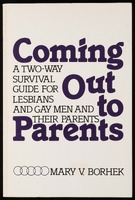 Coming out to parents : a two-way survival guide for lesbians and gay men and their parents In 1975, Mary Borhek (1922-2016) learnt that her son Steve was gay. As a member of the New Testament Church, Borhek initially believed homosexuality was a sin but, over the following years, she not only accepted Steve’s sexuality but became an activist for lesbian and gay rights, particularly within the church community. Borhek turned her experiences into two books aimed at supporting lesbians and gay men and their families – 1979’s ‘My Son Eric’ and, in 1983, the book that was seized during ‘Operation Tiger’, ‘Coming Out to Parents’. Borhek’s introduction to this book expresses sorrow that coming out still necessitates “such elaborate preparation”, and an example ‘Coming-out Letter from Rick to his Family’ is included at the end. The publisher of both books was the Christian Pilgrim Press.
Coming out to parents : a two-way survival guide for lesbians and gay men and their parents In 1975, Mary Borhek (1922-2016) learnt that her son Steve was gay. As a member of the New Testament Church, Borhek initially believed homosexuality was a sin but, over the following years, she not only accepted Steve’s sexuality but became an activist for lesbian and gay rights, particularly within the church community. Borhek turned her experiences into two books aimed at supporting lesbians and gay men and their families – 1979’s ‘My Son Eric’ and, in 1983, the book that was seized during ‘Operation Tiger’, ‘Coming Out to Parents’. Borhek’s introduction to this book expresses sorrow that coming out still necessitates “such elaborate preparation”, and an example ‘Coming-out Letter from Rick to his Family’ is included at the end. The publisher of both books was the Christian Pilgrim Press. -
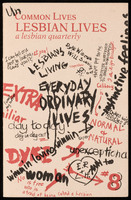 Common lives/lesbian lives : a lesbian feminist quarterly. Number eight, Summer 1983 Founded in 1981 and edited, typeset, printed and bound by a lesbian collective from Iowa City, ‘Common Lives/Lesbian Lives’ was a quarterly journal committed to “describing the lives of ordinary lesbians” in all their diversity. As the front matter states, this included “lesbians of color, Jewish lesbians, fat lesbians, lesbians over fifty and under twenty years old, physically challenged lesbians, poor and working-class lesbians and lesbians of varying cultural backgrounds”. This issue features poetry, childhood memoir from Joan Nestle and a piece showcasing visual art, with black-and-white reproductions. It is also notable for the essay ‘Love as Addiction – A Story of Battering’ by Kate Hurley, one of the first explorations of intimate partner violence among same-gender couples. ‘Common Lives/Lesbian Lives’ ran for a total of 56 issues, until its primary distributor went bankrupt in 1995.
Common lives/lesbian lives : a lesbian feminist quarterly. Number eight, Summer 1983 Founded in 1981 and edited, typeset, printed and bound by a lesbian collective from Iowa City, ‘Common Lives/Lesbian Lives’ was a quarterly journal committed to “describing the lives of ordinary lesbians” in all their diversity. As the front matter states, this included “lesbians of color, Jewish lesbians, fat lesbians, lesbians over fifty and under twenty years old, physically challenged lesbians, poor and working-class lesbians and lesbians of varying cultural backgrounds”. This issue features poetry, childhood memoir from Joan Nestle and a piece showcasing visual art, with black-and-white reproductions. It is also notable for the essay ‘Love as Addiction – A Story of Battering’ by Kate Hurley, one of the first explorations of intimate partner violence among same-gender couples. ‘Common Lives/Lesbian Lives’ ran for a total of 56 issues, until its primary distributor went bankrupt in 1995. -
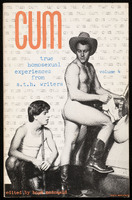 Cum : true homosexual experiences from S.T.H. Volume 4 This volume of “more than 100 sexually explicit stories” is one of a few anthologies culled from ‘Straight to Hell’, the magazine self-published by Boyd McDonald (1925-1993), that were seized during the raids. The collection gathers ‘true’ stories of sexual experiences, sent to the magazine by its readers, interspersed with black-and-white photographs. The book notes that the pictures are posed by professional models, and their inclusion “does not imply that they are necessarily homosexual”. The humour of these publications is reflected in the title of the cover photograph, taken by Mike Arlen – ‘A typical laundry scene in present-day London’.
Cum : true homosexual experiences from S.T.H. Volume 4 This volume of “more than 100 sexually explicit stories” is one of a few anthologies culled from ‘Straight to Hell’, the magazine self-published by Boyd McDonald (1925-1993), that were seized during the raids. The collection gathers ‘true’ stories of sexual experiences, sent to the magazine by its readers, interspersed with black-and-white photographs. The book notes that the pictures are posed by professional models, and their inclusion “does not imply that they are necessarily homosexual”. The humour of these publications is reflected in the title of the cover photograph, taken by Mike Arlen – ‘A typical laundry scene in present-day London’. -
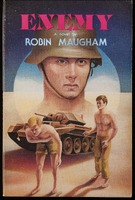 Enemy : a novel First published in the UK in 1981 as ‘The Deserters’, ‘Enemy’ was based initially on Robin Maugham’s play of the same name, which premiered in Guildford in 1969 before transferring to London. Maugham (1916-1981), the nephew of the novelist W. Somerset Maugham, drew on his experience in the Sahara during the Second World War for this tale of two soldiers, one British and one German, who stumble across each other in the desert. Maugham depicts a friendship that crosses boundaries of class, sexuality and nationality. Supported by Peter Burton, who edited Maugham’s short-story collection ‘The Boy from Beirut’, another of the books seized in ‘Operation Tiger’, ‘Enemy’ was the last book Maugham published before he died.
Enemy : a novel First published in the UK in 1981 as ‘The Deserters’, ‘Enemy’ was based initially on Robin Maugham’s play of the same name, which premiered in Guildford in 1969 before transferring to London. Maugham (1916-1981), the nephew of the novelist W. Somerset Maugham, drew on his experience in the Sahara during the Second World War for this tale of two soldiers, one British and one German, who stumble across each other in the desert. Maugham depicts a friendship that crosses boundaries of class, sexuality and nationality. Supported by Peter Burton, who edited Maugham’s short-story collection ‘The Boy from Beirut’, another of the books seized in ‘Operation Tiger’, ‘Enemy’ was the last book Maugham published before he died. -
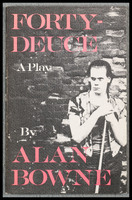 Forty-deuce : a play This dark play was first performed Off Off-Broadway in 1981 and gave Kevin Bacon (seen here on the cover) an early, award-winning role. The play’s title is a riff on both the tennis score and a junction at New York's 42nd Street known as ‘the Deuce’, where sex shops, porn cinemas and peep shows were clustered. The play, by Alan Bowne (1945-1989), depicts the death and exploitation of a young boy alongside a critique of commodity culture and was published by Felice Picano’s Sea Horse Press. Sea Horse Press was one of the Gay Presses of New York collective, which worked to increase the visibility of gay books.
Forty-deuce : a play This dark play was first performed Off Off-Broadway in 1981 and gave Kevin Bacon (seen here on the cover) an early, award-winning role. The play’s title is a riff on both the tennis score and a junction at New York's 42nd Street known as ‘the Deuce’, where sex shops, porn cinemas and peep shows were clustered. The play, by Alan Bowne (1945-1989), depicts the death and exploitation of a young boy alongside a critique of commodity culture and was published by Felice Picano’s Sea Horse Press. Sea Horse Press was one of the Gay Presses of New York collective, which worked to increase the visibility of gay books. -
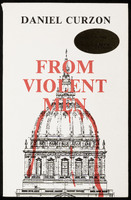 From violent men : a novel In 1978, gay politician Harvey Milk and Mayor George Moscone were assassinated in San Francisco by former city Supervisor Dan White. Daniel Curzon (1938-) self-published this loosely fictionalised version of the aftermath of these deaths through IGNA (or International Gay News Agency). He had experienced “a decade of frustration with publishing houses” over this and other works, according to a 1983 article in ‘Out’ magazine. This copy is inscribed by the author, “Give ‘em hell at Customs! Long live Oscar Wilde, D.H. Lawrence and gay rights!”, and dated 27 February 1985. “D.H. Lawrence” is a reference to the ‘Lady Chatterley’s Lover’ trial in 1960, when the amended Obscene Publications Act 1959 allowed for a work to be defended on the grounds of literary merit for the first time. Curzon’s short story collection ‘Human Warmth and Other Stories’ was also seized in ‘Operation Tiger’.
From violent men : a novel In 1978, gay politician Harvey Milk and Mayor George Moscone were assassinated in San Francisco by former city Supervisor Dan White. Daniel Curzon (1938-) self-published this loosely fictionalised version of the aftermath of these deaths through IGNA (or International Gay News Agency). He had experienced “a decade of frustration with publishing houses” over this and other works, according to a 1983 article in ‘Out’ magazine. This copy is inscribed by the author, “Give ‘em hell at Customs! Long live Oscar Wilde, D.H. Lawrence and gay rights!”, and dated 27 February 1985. “D.H. Lawrence” is a reference to the ‘Lady Chatterley’s Lover’ trial in 1960, when the amended Obscene Publications Act 1959 allowed for a work to be defended on the grounds of literary merit for the first time. Curzon’s short story collection ‘Human Warmth and Other Stories’ was also seized in ‘Operation Tiger’. -
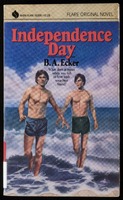 Independence day “What does it mean when you fall in love with your best friend?”, asks the cover of this coming-of-age story, which depicts identically clad high-school students Mike and Todd. Mike decides to tell Todd how he feels about him on 4 July – Independence Day in the US – and although Todd does not feel the same, this proto-Young Adult novel models understanding and acceptance. By its close, Mike has “dated several guys” in college and is taking a course “to become a counselor to gay kids”. B.A. Ecker includes a reference to another of the books erroneously seized in ‘Operation Tiger’, Patricia Nell Warren’s ‘The Front Runner’ (1974), which Mike “really found some comfort reading”. ‘Independence Day’ appears to be Ecker’s only published work.
Independence day “What does it mean when you fall in love with your best friend?”, asks the cover of this coming-of-age story, which depicts identically clad high-school students Mike and Todd. Mike decides to tell Todd how he feels about him on 4 July – Independence Day in the US – and although Todd does not feel the same, this proto-Young Adult novel models understanding and acceptance. By its close, Mike has “dated several guys” in college and is taking a course “to become a counselor to gay kids”. B.A. Ecker includes a reference to another of the books erroneously seized in ‘Operation Tiger’, Patricia Nell Warren’s ‘The Front Runner’ (1974), which Mike “really found some comfort reading”. ‘Independence Day’ appears to be Ecker’s only published work. -
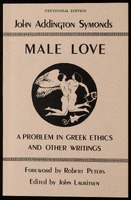 Male love : a problem in Greek ethics and other writings Poet and literary critic John Addington Symonds (1840-1893) had several same-sex relationships both before and after his marriage in 1864 to Janet Catherine North, with whom he had four daughters. ‘A Problem in Greek Ethics’, an extensive study of sexuality in Ancient Greece, including the culturally sanctioned practice of pederasty (sex between men and adolescent boys), was written in 1873 and published privately a decade later in an edition of ten. In 1897, it was expanded as an appendix to sexologist Havelock Ellis’s ‘Sexual Inversion’ (though immediately suppressed) and was subsequently reprinted over the course of the twentieth century, often using fictitious imprints to avoid prosecution. The Pagan Press edition of 1983, edited by John Lauritsen, marked the centenary of the work’s first publication and was named one of the ten best gay books of the year by ‘The Advocate’ newspaper.
Male love : a problem in Greek ethics and other writings Poet and literary critic John Addington Symonds (1840-1893) had several same-sex relationships both before and after his marriage in 1864 to Janet Catherine North, with whom he had four daughters. ‘A Problem in Greek Ethics’, an extensive study of sexuality in Ancient Greece, including the culturally sanctioned practice of pederasty (sex between men and adolescent boys), was written in 1873 and published privately a decade later in an edition of ten. In 1897, it was expanded as an appendix to sexologist Havelock Ellis’s ‘Sexual Inversion’ (though immediately suppressed) and was subsequently reprinted over the course of the twentieth century, often using fictitious imprints to avoid prosecution. The Pagan Press edition of 1983, edited by John Lauritsen, marked the centenary of the work’s first publication and was named one of the ten best gay books of the year by ‘The Advocate’ newspaper. -
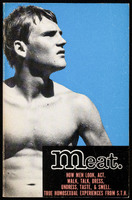 Meat : how men look, act, walk, talk, dress, undress, taste & smell Described in the introduction by ‘Fag Rag’ co-founder and Walt Whitman scholar Charles Shively as “an unprecedented piece of literature”, ‘Meat’ is an anthology of writing from the first forty-seven issues of ‘Straight to Hell (S.T.H.)’, a self-published magazine sometimes known by other titles including ‘The Manhattan Review of Unnatural Acts’. Created by Boyd McDonald (1925-1993), the publication predominantly contains explicit true stories of gay men’s sexual experiences which have been submitted by readers. These are accompanied by photos of muscular men, not unlike those published in physique magazines, often posed by models from agencies such as the Athletic Model Guild. This collection is published by Gay Sunshine Press, and the back cover includes quotes from readers including Gore Vidal, William Burroughs and Allen Ginsberg.
Meat : how men look, act, walk, talk, dress, undress, taste & smell Described in the introduction by ‘Fag Rag’ co-founder and Walt Whitman scholar Charles Shively as “an unprecedented piece of literature”, ‘Meat’ is an anthology of writing from the first forty-seven issues of ‘Straight to Hell (S.T.H.)’, a self-published magazine sometimes known by other titles including ‘The Manhattan Review of Unnatural Acts’. Created by Boyd McDonald (1925-1993), the publication predominantly contains explicit true stories of gay men’s sexual experiences which have been submitted by readers. These are accompanied by photos of muscular men, not unlike those published in physique magazines, often posed by models from agencies such as the Athletic Model Guild. This collection is published by Gay Sunshine Press, and the back cover includes quotes from readers including Gore Vidal, William Burroughs and Allen Ginsberg. -
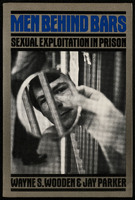 Men behind bars : sexual exploitation in prison This is an in-depth study of exploitative and consensual sex between men in prison, drawing on qualitative interviews with men in a medium-security correctional facility in California. It covers themes such as the prison setting, prison policy and staff attitudes towards homosexuality. Wayne Wooden, a sociologist, was based for several years at Cal Poly Pomona. He has also worked on aging and was an active member of the National Association of Lesbian and Gay Gerontology. First published by New York’s Plenum Press in 1982, ‘Men Behind Bars’ was then published by Da Capo in 1983 – this is the paperback edition of the following year.
Men behind bars : sexual exploitation in prison This is an in-depth study of exploitative and consensual sex between men in prison, drawing on qualitative interviews with men in a medium-security correctional facility in California. It covers themes such as the prison setting, prison policy and staff attitudes towards homosexuality. Wayne Wooden, a sociologist, was based for several years at Cal Poly Pomona. He has also worked on aging and was an active member of the National Association of Lesbian and Gay Gerontology. First published by New York’s Plenum Press in 1982, ‘Men Behind Bars’ was then published by Da Capo in 1983 – this is the paperback edition of the following year. -
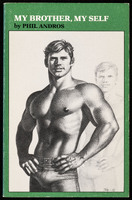 My brother, my self This is the second of three Phil Andros (pseudonym of Samuel M. Steward, 1909-1993) titles seized during the raids. As with the other Andros titles published by Perineum Press, the cover is a specially commissioned Tom of Finland (Touko Laaksonen) illustration of the Phil Andros character (Steward was very pleased with these drawings). This novel was first published in 1970 by pulp publisher Gay Parisian Press under the title ‘My Brother, the Hustler’, so the title was altered to avoid legal issues. Featuring more sexual exploits of the character Phil Andros, the “brother” of the title is his doppelgänger, Denny. The two men can psychically communicate and are often confused for one another.
My brother, my self This is the second of three Phil Andros (pseudonym of Samuel M. Steward, 1909-1993) titles seized during the raids. As with the other Andros titles published by Perineum Press, the cover is a specially commissioned Tom of Finland (Touko Laaksonen) illustration of the Phil Andros character (Steward was very pleased with these drawings). This novel was first published in 1970 by pulp publisher Gay Parisian Press under the title ‘My Brother, the Hustler’, so the title was altered to avoid legal issues. Featuring more sexual exploits of the character Phil Andros, the “brother” of the title is his doppelgänger, Denny. The two men can psychically communicate and are often confused for one another. -
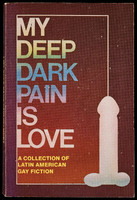 My deep dark pain is love : a collection of Latin American gay fiction This anthology, edited by Winston Leyland (1940-), presents a selection of short stories, novellas and excerpts from longer works from a wide range of male Argentinian, Mexican, Cuban, Chilean and Brazilian authors. It is illustrated with graphic line-drawings by Argentian artist Jorge Gumier Maier and is a follow up to Gay Sunshine Press’s ‘Now the Volcano’ (1979) which focused on Mexico, Brazil and Colombia. Like the first anthology, Brazilian literature predominates in this collection. It is a collaboration between Leyland, who travelled extensively in Latin America, and frequent Gay Sunshine translator, E. A. Lacey (1938-1995). The two anthologies form part of a small body of books from Gay Sunshine Press with a Latin American focus, including Luis Zapata’s ‘Adonis García’ and Adolfo Caminha’s ‘Bom-Crioulo’, both of which were also seized in the ‘Operation Tiger’ raids.
My deep dark pain is love : a collection of Latin American gay fiction This anthology, edited by Winston Leyland (1940-), presents a selection of short stories, novellas and excerpts from longer works from a wide range of male Argentinian, Mexican, Cuban, Chilean and Brazilian authors. It is illustrated with graphic line-drawings by Argentian artist Jorge Gumier Maier and is a follow up to Gay Sunshine Press’s ‘Now the Volcano’ (1979) which focused on Mexico, Brazil and Colombia. Like the first anthology, Brazilian literature predominates in this collection. It is a collaboration between Leyland, who travelled extensively in Latin America, and frequent Gay Sunshine translator, E. A. Lacey (1938-1995). The two anthologies form part of a small body of books from Gay Sunshine Press with a Latin American focus, including Luis Zapata’s ‘Adonis García’ and Adolfo Caminha’s ‘Bom-Crioulo’, both of which were also seized in the ‘Operation Tiger’ raids. -
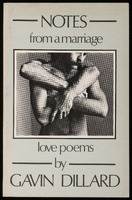 Notes from a marriage : love poems Since the mid-1970s, the creative output of Gavin Geoffrey Dillard (1954-) has encompassed many forms including poetry, songwriting and acting in pornographic films. This poetry collection, Dillard’s third, explores the emotional and sexual relationship between two young men, with some undertones of violence. It was published in New York by Felice Picano’s Sea Horse Press. In 1988, Australian gay rights activist Dennis Altman described Dillard as “the laureate of the sensual”, while Dillard’s poetry forms the basis of Clint Borzoni’s 2014 opera ‘When Adonis Calls’. Today, Dillard self-publishes books under his Gavin Dillard Poetry Library & Archive imprint and recently produced a new text and photographic edition of ‘Notes from a Marriage’.
Notes from a marriage : love poems Since the mid-1970s, the creative output of Gavin Geoffrey Dillard (1954-) has encompassed many forms including poetry, songwriting and acting in pornographic films. This poetry collection, Dillard’s third, explores the emotional and sexual relationship between two young men, with some undertones of violence. It was published in New York by Felice Picano’s Sea Horse Press. In 1988, Australian gay rights activist Dennis Altman described Dillard as “the laureate of the sensual”, while Dillard’s poetry forms the basis of Clint Borzoni’s 2014 opera ‘When Adonis Calls’. Today, Dillard self-publishes books under his Gavin Dillard Poetry Library & Archive imprint and recently produced a new text and photographic edition of ‘Notes from a Marriage’. -
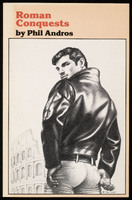 Roman conquests The third Phil Andros (pseudonym of Samuel M. Steward, 1909-1993) book seized during the raids, this erotic novel is set in Rome where Andros meets and has sex with a range of characters, some of whom are described on the back cover, including “a sexton with a feeling for ritual” and “a carabiniere in black boots”. The book was first published in 1971 by the pulp publisher Gay Parisian Press under the title ‘When in Rome, Do...’ In keeping with his tendency to merge fact and fiction, Steward has dedicated this book to another of his alter egos, Ward Stames. This copy has an inscription from Andros to Gay’s The Word which refers to supposedly ‘obscene’ Roman classical works held at the British Museum.
Roman conquests The third Phil Andros (pseudonym of Samuel M. Steward, 1909-1993) book seized during the raids, this erotic novel is set in Rome where Andros meets and has sex with a range of characters, some of whom are described on the back cover, including “a sexton with a feeling for ritual” and “a carabiniere in black boots”. The book was first published in 1971 by the pulp publisher Gay Parisian Press under the title ‘When in Rome, Do...’ In keeping with his tendency to merge fact and fiction, Steward has dedicated this book to another of his alter egos, Ward Stames. This copy has an inscription from Andros to Gay’s The Word which refers to supposedly ‘obscene’ Roman classical works held at the British Museum. -
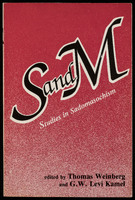 S and M : studies in sadomasochism This anthology is part of a series entitled ‘New Concepts in Human Sexuality’ which was edited by Vern L. Bullough (1928-2006), a sexologist, historian and sociologist. The two editors of this volume, sociology professor Thomas Weinberg (1943-) and scholar and public health worker G.W. Levi Kamel (1947-1989), approach sadomasochism from a sociological rather than a psychopathological perspective although the book begins with acknowledgement of that traditional view in a chapter focussing on Richard von Krafft-Ebing, Sigmund Freud and Havelock Ellis. Most of the work considers the social behaviour of those involved with sadomasochism – gay and straight – via exploration of identity, interaction and organization. The book is published by Prometheus Books which was founded in 1969 by secular humanist and academic Paul Kurtz.
S and M : studies in sadomasochism This anthology is part of a series entitled ‘New Concepts in Human Sexuality’ which was edited by Vern L. Bullough (1928-2006), a sexologist, historian and sociologist. The two editors of this volume, sociology professor Thomas Weinberg (1943-) and scholar and public health worker G.W. Levi Kamel (1947-1989), approach sadomasochism from a sociological rather than a psychopathological perspective although the book begins with acknowledgement of that traditional view in a chapter focussing on Richard von Krafft-Ebing, Sigmund Freud and Havelock Ellis. Most of the work considers the social behaviour of those involved with sadomasochism – gay and straight – via exploration of identity, interaction and organization. The book is published by Prometheus Books which was founded in 1969 by secular humanist and academic Paul Kurtz. -
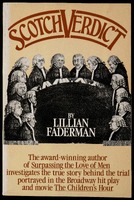 Scotch verdict* : Miss Pirie and Miss Woods v. Dame Cumming Gordon A “Scotch Verdict” results in the Scottish legal system if a case is “not proven” or is inconclusive. Using archival documents, historian Lillian Faderman (1940-) explores this outcome in the 1810 case of Edinburgh teachers Jane Pirie and Marianne Woods. The two women were accused by pupil Jane Cumming of having a sexual relationship which led to the removal of all pupils from the school. Having lost their work, Pirie and Woods brought a libel case against Jane’s grandmother, Dame Cumming Gordon, which ended in the titular Scotch Verdict. Unlike many of the ‘Operation Tiger’ titles, this book is still in print. The Pirie and Woods case also inspired Lillian Hellman’s 1934 play ‘The Children’s Hour’ which was later filmed.
Scotch verdict* : Miss Pirie and Miss Woods v. Dame Cumming Gordon A “Scotch Verdict” results in the Scottish legal system if a case is “not proven” or is inconclusive. Using archival documents, historian Lillian Faderman (1940-) explores this outcome in the 1810 case of Edinburgh teachers Jane Pirie and Marianne Woods. The two women were accused by pupil Jane Cumming of having a sexual relationship which led to the removal of all pupils from the school. Having lost their work, Pirie and Woods brought a libel case against Jane’s grandmother, Dame Cumming Gordon, which ended in the titular Scotch Verdict. Unlike many of the ‘Operation Tiger’ titles, this book is still in print. The Pirie and Woods case also inspired Lillian Hellman’s 1934 play ‘The Children’s Hour’ which was later filmed. -
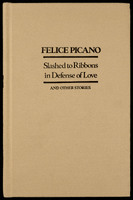 Slashed to ribbons in defense of love : and other stories Eleven semi-autobiographical short stories of gay love and sex in New York City (and popular gay beach resort, Fire Island). It was published by the collective Gay Presses of New York (Sea Horse Press, Calamus Press and J.H. Press). Felice Picano (1944-) founded Sea Horse Press in 1977 and the Gay Presses came together – with co-editors Terry Helbing and Larry Mitchell – in 1981. An award-winning writer, Picano had published several novels, short stories and a book of poems before this collection, and has been prolific since, producing memoir, plays, screenplays and co-writing ‘The New Joy of Gay Sex’ with Charles Silverstein in 1993. This copy is signed by the author and inscribed on the titlepage, “In brotherhood – and against censorship!”
Slashed to ribbons in defense of love : and other stories Eleven semi-autobiographical short stories of gay love and sex in New York City (and popular gay beach resort, Fire Island). It was published by the collective Gay Presses of New York (Sea Horse Press, Calamus Press and J.H. Press). Felice Picano (1944-) founded Sea Horse Press in 1977 and the Gay Presses came together – with co-editors Terry Helbing and Larry Mitchell – in 1981. An award-winning writer, Picano had published several novels, short stories and a book of poems before this collection, and has been prolific since, producing memoir, plays, screenplays and co-writing ‘The New Joy of Gay Sex’ with Charles Silverstein in 1993. This copy is signed by the author and inscribed on the titlepage, “In brotherhood – and against censorship!” -
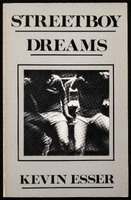 Streetboy dreams : a novel ‘Streetboy Dreams’ by Kevin Esser (1953-) was published by two out of the three Gay Presses of New York, who note the “controversial and divisive” nature of its subject matter. The novel details the relationship between Peter, a teacher in his mid-thirties, and teenage Gito. Unlike Bruce, the adult protagonist of Wallace Hamilton’s ‘Kevin’, Peter is not presented as a gay character, per se – the novel opens with the end of “another fling at heterosexuality”. Marketed at the time as “a different approach” to what was euphemistically known as “man/boy love”, it is hard to read the novel today as anything other than the story of a grooming – a glorification of unequal power dynamics and dubiously consensual sexual experience.
Streetboy dreams : a novel ‘Streetboy Dreams’ by Kevin Esser (1953-) was published by two out of the three Gay Presses of New York, who note the “controversial and divisive” nature of its subject matter. The novel details the relationship between Peter, a teacher in his mid-thirties, and teenage Gito. Unlike Bruce, the adult protagonist of Wallace Hamilton’s ‘Kevin’, Peter is not presented as a gay character, per se – the novel opens with the end of “another fling at heterosexuality”. Marketed at the time as “a different approach” to what was euphemistically known as “man/boy love”, it is hard to read the novel today as anything other than the story of a grooming – a glorification of unequal power dynamics and dubiously consensual sexual experience. -
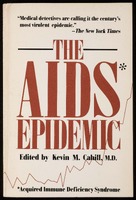 The AIDS epidemic In spring 1983, a “devastating, puzzling and fatal” new illness was spreading rapidly throughout the United States. At that time, some three to four years after the first cases of HIV/AIDS had emerged and under two years since the first cases were reported in the ‘New York Times’, New York City was the hardest-hit metropolitan area with 595 cases and 228 deaths. This astonishingly prescient book edited by physician Kevin Cahill (1936-2022) comprises the published proceedings of a symposium that took place at Lenox Hill Hospital, New York City. Doctors, epidemiologists and policy-makers gathered to discuss how they might combat the disease, stating that “there is every indication that we will soon be in the midst of a worldwide epidemic”. As of 2024, HIV has claimed over 40 million lives worldwide.
The AIDS epidemic In spring 1983, a “devastating, puzzling and fatal” new illness was spreading rapidly throughout the United States. At that time, some three to four years after the first cases of HIV/AIDS had emerged and under two years since the first cases were reported in the ‘New York Times’, New York City was the hardest-hit metropolitan area with 595 cases and 228 deaths. This astonishingly prescient book edited by physician Kevin Cahill (1936-2022) comprises the published proceedings of a symposium that took place at Lenox Hill Hospital, New York City. Doctors, epidemiologists and policy-makers gathered to discuss how they might combat the disease, stating that “there is every indication that we will soon be in the midst of a worldwide epidemic”. As of 2024, HIV has claimed over 40 million lives worldwide. -
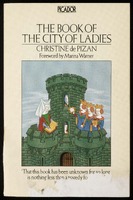 The book of the city of ladies This is quite possibly the most surprising book seized during the raids and certainly is the oldest narrative, first printed in French in 1405. Christine de Pisan (or Pizan) (1364-1430) was a Medieval Italian woman who lived in France and, following the death of her husband, wrote over twenty works to support her family. Using the device of a discussion with ladies called Reason, Rectitude and Justice, this work highlights women’s oppression, including lack of access to education and misogynistic portrayal in texts written by men, in words which have resonance for more contemporary feminist thought. As befits the times, the text is also underpinned by Christian values, and Christine spent her final years living in a convent. It is unclear which edition of the book was seized during the ‘Operation Tiger’ raids.
The book of the city of ladies This is quite possibly the most surprising book seized during the raids and certainly is the oldest narrative, first printed in French in 1405. Christine de Pisan (or Pizan) (1364-1430) was a Medieval Italian woman who lived in France and, following the death of her husband, wrote over twenty works to support her family. Using the device of a discussion with ladies called Reason, Rectitude and Justice, this work highlights women’s oppression, including lack of access to education and misogynistic portrayal in texts written by men, in words which have resonance for more contemporary feminist thought. As befits the times, the text is also underpinned by Christian values, and Christine spent her final years living in a convent. It is unclear which edition of the book was seized during the ‘Operation Tiger’ raids. -
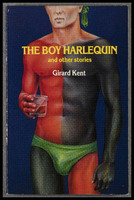 The boy harlequin : and other stories Fourteen short stories from a now little-known American author Girard Kent, the nom-de-plume of a Texan writer named Lon Rogers. Though the collection did well enough for Gay Sunshine Press to bring out a second edition in 1985, its mildly distasteful blend of humour and eroticism has not dated well. Several stories feature sexual relationships between adolescent boys and adult men, and as a perceptive contemporary review in New Zealand magazine ‘Pink Triangle’ noted, the characters feel more like “fantasy material” than fully realised protagonists. ‘The Boy Harlequin’ was Kent’s first book, and he seems to have published nothing further, either under his own name or his pen name.
The boy harlequin : and other stories Fourteen short stories from a now little-known American author Girard Kent, the nom-de-plume of a Texan writer named Lon Rogers. Though the collection did well enough for Gay Sunshine Press to bring out a second edition in 1985, its mildly distasteful blend of humour and eroticism has not dated well. Several stories feature sexual relationships between adolescent boys and adult men, and as a perceptive contemporary review in New Zealand magazine ‘Pink Triangle’ noted, the characters feel more like “fantasy material” than fully realised protagonists. ‘The Boy Harlequin’ was Kent’s first book, and he seems to have published nothing further, either under his own name or his pen name.
